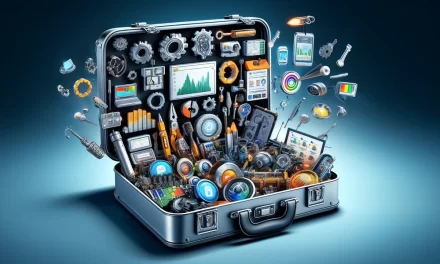Introduction
Imagine receiving a product recommendation so perfectly suited to your interests, it feels like magic. That’s the power of AI in marketing. Artificial intelligence (AI) and its branch, machine learning, are transforming the way businesses connect with customers. This might sound intimidating if you’re new to digital marketing, but don’t worry! AI is becoming more accessible than ever, offering game-changing benefits.
From saving you time to unlocking insights hidden in your data, AI can elevate your marketing efforts. Think of it like a super-efficient assistant that learns from your customers’ behavior. This lets you deliver personalized experiences, predict trends, and make smarter decisions – all leading to better results.
Ready to explore how AI can work for you? Let’s dive in!
Key Areas Where AI Excels in Marketing
AI isn’t a one-trick pony; it revolutionizes multiple facets of marketing. Let’s explore some key areas where it shines:
Content Creation: The Creative Assistant Imagine having an AI-powered “idea generator” at your fingertips. AI tools can help with blog headlines, social media captions, and even basic article drafts. Need to optimize content for search engines? AI tools can analyze top-ranking pages and suggest keywords to include. It’s like having a tireless writing assistant!
Personalization: Your Customers Feel Special AI can analyze customer data like browsing history, past purchases, and preferences. This allows you to deliver ultra-relevant content, offers, and recommendations. Think of the way Netflix suggests movies you might enjoy – that’s AI personalization in action! This tailored approach builds loyalty and increases conversions.
Predictive Analytics: The Marketing Crystal Ball Ever wish you could see into the future of your campaigns? AI makes this possible to a degree! Predictive analytics use machine learning to analyze massive datasets, uncovering patterns and potential outcomes. Marketers can use this to forecast which leads are most likely to convert, what type of content will resonate, or even anticipate upcoming market trends.
Campaign Optimization: Efficiency at Scale AI tools can monitor campaign performance in real-time across multiple channels like social media or Google Ads. This means you can identify underperforming ads or keywords faster, allowing for quick adjustments. Some AI tools even take it a step further, automatically tweaking your campaigns to maximize your budget and results.
Important Note: These are just the tip of the iceberg! AI is rapidly evolving, leading to innovative new applications in marketing.
Practical Steps to Start Using AI in Your Marketing
You might be eager to harness the power of AI, but it’s wise to approach it strategically. Here’s how to begin integrating AI into your marketing efforts:
Assess Your Needs: Don’t chase after shiny AI tools just because they exist. Start by asking yourself:
- Where are the bottlenecks in your current marketing processes? (E.g., time-consuming data analysis, difficulty creating enough content)
- What specific goals do you want to improve? (E.g., better lead qualification, increased website conversions)
Start Small: It’s better to master one AI tool at a time rather than get overwhelmed. Consider experimenting with:
- AI Chatbots: Provide basic customer support 24/7, freeing up your team. Many platforms make these easy to set up.
- AI for Social Media: Tools for sentiment analysis can tell you how customers feel about your brand, while others help generate engaging captions.
- AI-powered Email Marketing: Some tools optimize subject lines for better open rates or personalize content based on subscriber behavior.
Explore AI Marketing Tools: The landscape is vast, so some initial research is key. Here’s a starting point:
- Content Generation: Platforms like Jasper or Rytr assist with various writing tasks.
- Social Media Analytics: Tools like Sprout Social or Brandwatch use AI for deeper insights.
- Predictive Analytics: Solutions like Albert AI or Google Analytics offer forecasting capabilities.
Data is King: The accuracy and effectiveness of AI depend heavily on having clean, well-organized data. Take these steps:
- Audit your data: Assess what you currently collect and how it’s stored.
- Unify your data: If customer information is spread across multiple systems, look for ways to consolidate it.
- Prioritize data quality: Set up processes to ensure you’re gathering accurate, relevant information going forward.
Real-World Example: A small e-commerce shop struggles to handle a high volume of customer inquiries. They implement a simple AI chatbot on their website. The chatbot answers common questions (product availability, shipping times, returns), significantly reducing support tickets for the team. This frees up time for more complex customer interactions.
Remember, AI is a tool, not a magic bullet. The most successful AI implementations involve setting clear goals, choosing the right tools, and consistently feeding your AI systems accurate data.
AI-Powered Marketing in Action: Case Studies
Seeing how others use AI makes it less abstract. Let’s look at a few inspiring examples:
Case Study 1: The Personalized Coffee Experience Starbucks leverages AI to analyze customer data and purchasing history. This allows them to deliver highly targeted offers, loyalty rewards, and even suggest new drinks based on individual preferences. The result? Increased customer engagement and loyalty.
Case Study 2: AI Content at Scale A large publishing company uses AI-powered tools to generate initial drafts of articles on trending topics. This speeds up production, allowing human writers to focus on refining the content and adding their expertise. They are able to significantly increase their content output.
Case Study 3: AI for Smarter Social Media A small business previously struggled to maintain a consistent presence across social media platforms. They adopted an AI-powered social media management tool that suggests optimal posting times, curates relevant content, and analyzes sentiment towards their brand. This led to increased engagement and reach without overextending their small team.
The Takeaway
These examples illustrate the versatility of AI in marketing. Regardless of your industry or company size, there are likely AI solutions to streamline your efforts and improve results. The key is to identify the specific pain points AI can alleviate within your business.
Don’t be afraid to seek inspiration from companies making innovative use of AI. As technology evolves, so will the possibilities for leveraging it in your marketing strategy.
The Future of AI and Marketing
The AI revolution in marketing is just getting started. As AI capabilities continue to advance, we can expect even more transformative changes in the way we connect with customers. Here are a few exciting trends to watch:
Hyper-personalization: AI will enable us to go beyond basic segmentation to deliver truly individualized experiences. Imagine websites that morph in real-time based on a visitor’s interests or emails that feel like they were written just for the recipient.
Voice-Driven AI: As virtual assistants like Alexa and Siri become more sophisticated, voice search and voice-controlled interactions will play a larger role in marketing.
The AI-Enhanced Marketer: Marketers won’t be replaced, but their roles will evolve. AI will handle routine analysis and optimization, freeing up marketers to focus on strategy, creativity, and building meaningful relationships with customers.
Ethical Considerations: As AI becomes more powerful, it’s crucial for businesses to use it responsibly. Transparency about data usage, addressing potential biases in algorithms, and ensuring AI aligns with your brand values will be paramount.
The future of marketing is undoubtedly intertwined with AI. Staying informed about the latest tools and best practices won’t just be an advantage; it will become a necessity for staying competitive. The good news is that AI has the potential to make marketing more efficient, data-driven, and customer-centric than ever before.
Conclusion
AI and machine learning offer tremendous potential to reshape your marketing efforts. From streamlining tasks to unlocking insights hidden within your data, the benefits are clear. If you’re new to the world of AI marketing, remember — start with your goals in mind. Experiment with focused AI tools that address your specific needs.
The most important thing is to take that first step! Don’t be intimidated by the technology. There are AI solutions for every budget and skill level. As you gain experience, you can gradually expand your use of AI to drive even better results.
Resources to Get You Started
https://blog.hubspot.com/marketing/ai-marketing
https://www.sprinklr.com/blog/ai-in-marketing/
You can easily find lists online by searching for “best AI marketing tools”
The AI revolution is here. Embrace it and watch your marketing strategy soar!











